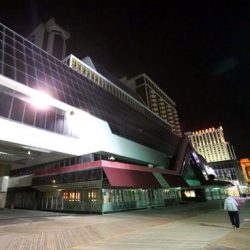Trump Entertainment Resorts submitted a deed restriction this week announcing the Trump Plaza property could not be used as a casino for the next 10 years. The company agreed to keep the casino closed for a decade in order to avoid a higher tax rate on the property.
Payment in Lieu of Taxes
The move is meant to avoid higher taxes in a proposed PILOT bill which would set the tax rate for casinos for the next 15 years in New Jersey. A PILOT is a “payment in lieu of taxes”. If a PILOT law is passed, then an operator would be a set tax rate every year, instead of having taxes adjusted according to the revenues collected.
Under the proposed PILOT program passed on June 11, the casinos of New Jersey would pay a set rate of $120 million in taxes each year for the next 15 years. The casinos would not be able to appeal their tax liability. A percentage of the money collected would be used to pay down Atlantic City’s debt. AC schools would receive less funding, but state funding would help make up the difference. Also, health benefits and pension benefits for casino workers would be mandated by law.
Atlantic City Alliance Eliminated
The PILOT bill would eliminate Atlantic City Alliance, which has received $30 million a year. That money would be used to pay down the Alantic City debt. The new law would therefore be designed to help the casino industry stabilize its financial forecasts, while helping Atlantic City dig itself out of its debt situation.
The elimination of the Atlantic City Alliance might hurt some services, but it is thought the ERG program would be able to make up some of the difference. The EDA released a statement on the matter: “The New Jersey Economic Development Authority (EDA) is an independent State agency that finances small and mid-sized businesses, administers tax incentives to retain and grow jobs, revitalizes communities through redevelopment initiatives, and supports entrepreneurial development by providing access to training and mentoring programs.”
Avoiding Court Cases
The main effect of the PILOT bill would be to offer a tax break for the casinos, though. In the old system, taxes would be assessed each year. The Atlantic City casinos almost always appealed their tax burden to court, so lawyer bills on each side would be incurred as the tax process was drawn out. Also, casino operators could never tell from year-to-year what their tax liability might be, so they could not plan their yearly budget properly.
Under the new system, much of the fretting about taxes would be ended. The system would take a lot of the acrimony out of the process. On the other hand, closed casinos might be assessed a tax burden as if they were operating.
Carl Icahn’s Role
Carl Icahn wants to avoid those taxes, which is why Trump Entertainment Resorts made the announcement it did. The state legislature appears to have included several clauses which might harm Carl Icahn’s operations, in fact.
Health Benefits Provision
Trump Entertainment won a court battle in October 2014 involving the health and pension benefits for Unite Here Local 54 workers. The PILOT bill’s health benefits provisions might be a ploy to lock in benefits, so a court cannot take benefits away from employees of the casinos.
Chances of Passage
The General Assembly passed the bill on June 11, while the Senate passed the bill on June 25. Now, the PILOT has to go before Governor Chris Christie for signing. Lawmakers say they are uncertain whether Christie will sign the bill, though it had bipartisan support in the legislature.
Chris Brown Is Not Pleased
Whether Carl Icahn’s ploy to avoid taxes is going to work is another matter. Icahn is a deft businessman, but he is not a popular figure. Top New Jersey lawmakers held the PILOT from a vote in December 2014 in order to keep from giving Icahn advantages. Some provisions of the bill seem targeted at him. Luckily for Carl Icahn, he might be able to have a judge decide on whether a closed casino would be liable for PILOT taxes (despite provisions against appeals), so he might be able to avoid taxes through the court system–one of the contingencies the PILOT was supposed to avoid.
State Senator Chris Brown, who has fought for a year to undo deed restrictions placed by Caesars Entertainment on a casino last year, is not happy with the action. Brown told the Press of Atlantic City that the Trump Entertainment deed restrictions smacks “of greedy corporate executives usurping the state’s authority for planning and zoning, for their own corporate benefit.“

